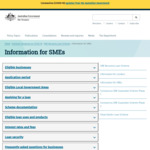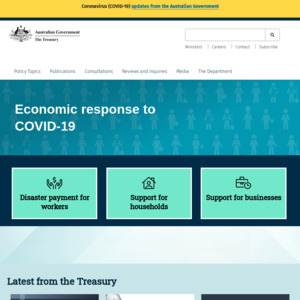This is a scheme by the Federal Governments for qualifying small and medium businesses (SME) affected by COVID or the floods. The Government will guarantee 80% of the loan amount to the lenders. Summary below - see here for full information.
Eligible businesses
The Scheme is only open to firms with turnover of up to $250 million that either received JobKeeper payments in the March quarter of 2021 or have been affected by the floods eligible LGAs in March 2021.
Both self‑employed individuals and non-profit businesses are eligible. Businesses that have accessed loans in Phase 1 and Phase 2 can also apply for loans under the scheme.
Application Period
Loans will be made available from 1 April 2021 until 31 December 2021.
Eligible loan uses and products
Lenders can offer any product suitable to the borrower, with the exception of credit cards, charge cards, debit cards or business cards. Loans issued under the Scheme may take any other form of credit, provided the Scheme’s eligibility criteria are met.
Loans issued under the Scheme can be used to refinance existing loans or for a broad range of businesses purposes (including to support investment) but cannot be used to:
- purchase of residential property;
- purchase of financial products;
- lending to an associated entity; or
- lease, rent, hire, hire-purchase existing assets that are more than half way into their effective life.
Interest rates and fees
The interest rate on loans will be determined by lenders, but will be capped at around 7.5 per cent, with some flexibility for interest rates on variable rate loans to increase if market interest rates rise over time.
Lenders must disclose the effective loan interest rate to the borrower at the time of the loan agreement.
Fees will be determined by lenders but can only be charged to the extent they are consistent with fees on similar loans outside the Scheme. No fees are permitted to be applied to undrawn facilities.
Participating Lenders (googled links - use with care)
* ANZ
* Bank of Queensland
* Commonwealth Bank of Australia
* Fifo Capital Australia (link to scheme not found)
* Get Capital (link to scheme not found)
* Judo Bank
* Liberty Finance
* Moneytech Finance
* National Australia Bank
* Queensland Country Bank
* Regional Australia Bank
* Social Enterprise Finance Australia
* South West Credit Union Co-operative (link to scheme not found)
* Suncorp-Metway
* The Mutual Bank (link to scheme not found)
* TrailBlazer Finance
* Unity Bank
* Webster Dolilta Finance Ltd (link to scheme not found)
* Westpac


@OP would it be useful to update so interest rates and fees are mentioned in the body description?